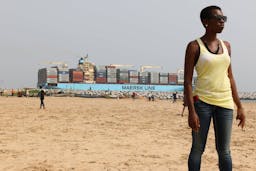COALITION FOR SUSTAINABILITY:POST EVALUATION OF THE CLIMATE CHANGE CONFERENCE
Jan 21, 2015
Story
INTRO
The just concluded United Nations Summit on Climate Change which took place in Durban, South Africa between the 28th of November and 10th of December 2011 resulted in an extension of the Kyoto Protocol that is meant to elapse at the end of 2012.
This resolution and other modalities reached such as the green climate fund and further negotiation on a legal binding agreement that would help reduce global emission, portend a lots for Africa and Nigeria in particular.
The inability of this year’s negotiation in Durban to achieve the set target that would bring world temperature to 1.5 degree Celsius, as agitated by the Africa Continent would further increase the effect of climate change. Africa, whose economy is fragile and classified as a developing continent, will only have to learn how to adapt to these changes as they unfold.
VISION
This, among other salient reasons informed the decision of some participants at the conference to convene under the platform of Coalition for Sustainability in Lagos on December 14, 2011 to look into, how Nigeria would either convert the threats associated with Climate Change into opportunities, a post evaluation of Nigeria Delegation performance to the conference and the way forward for the nation in relations to climate change and other serious environmental and sustainability challenges.
In his opening remarks, the convener of the meeting, Architect Tunde Imolehin, expressed the need to put into action the various experiences garnered at the epochal conference whether bad or good. A post-evaluation effort, according to him, would go a long way in assisting local action towards improvement in future participation at international conferences and ensuring sustainable development in all facets of human endeavours in Africa, Nigeria in particular.
The meeting had in attendance members of the Civil Society Organization, the media and the President of Africa Union of Architects (AUA), Chief Tokunbo Omisore. Participants, who also attended the climate change conference expressed displeasure at the lack of co-ordination among the Nigeria delegates. According to a member of the civil society group, Mr. Sulaimon Arigbabu, the late presence of the Nigeria Federal delegation and also the absence of a National stand at the exhibition venue show lack of commitment on the side of the government.
Mr. Arigbabu said even smaller countries whose population are not even up to Lagos State, had exhibition stands with materials to show to the world.
Chief Omisore who visited Durban before the conference said the time has come for Africa to promote eco-architecture and the building industry to be efficient. He said the Africa Union is taking the issue of green architecture seriously. Furthermore he called on the government to provide humane shelters for the populace, as there are lots of housing deficit and the houses should be affordable for the poor in the society.
WAY FORWARD
After the meeting the following recommendations were made:
Uncurbed emission of greenhouse gases should be checked before the effect of climate change becomes devastating.
Alternative source of energy as renewable energy is becoming popular around the world and the gases flared in the Niger Delta region should be used to generate power.
Diversification of the economy because this would help provide enough revenue for development as over dependence on oil production is not healthy for the nation.
Government should champion the course for solar energy usage because Nigeria traps a lot of solar energy daily from the sun.
Proper Co-ordination in the Federal Ministry of the Environment towards planning and preparing for subsequent climate change conferences.
Climate Change should not be treated as an environment issue but a developmental and sustainable phenomenon, which affects every aspect of human existence.
Technocrat should be appointed to head climate change department to help the country understand the intricacies of climate change, since climate change governance affect all sectors of the economy and should be given top priority.
Plan for the future by increasing the budget for climate change related issues.
The meeting also called for the consolidation of the “Coalition for Sustainability” into a formidable advocacy group on sustainable development issues in Africa with specific goals and objectives.
The time to act to save the future of Nigeria from the impending and adverse effect of climate change is now as the country is shrinking due to the threat from both the Atlantic Ocean and the Sahara Desert.




